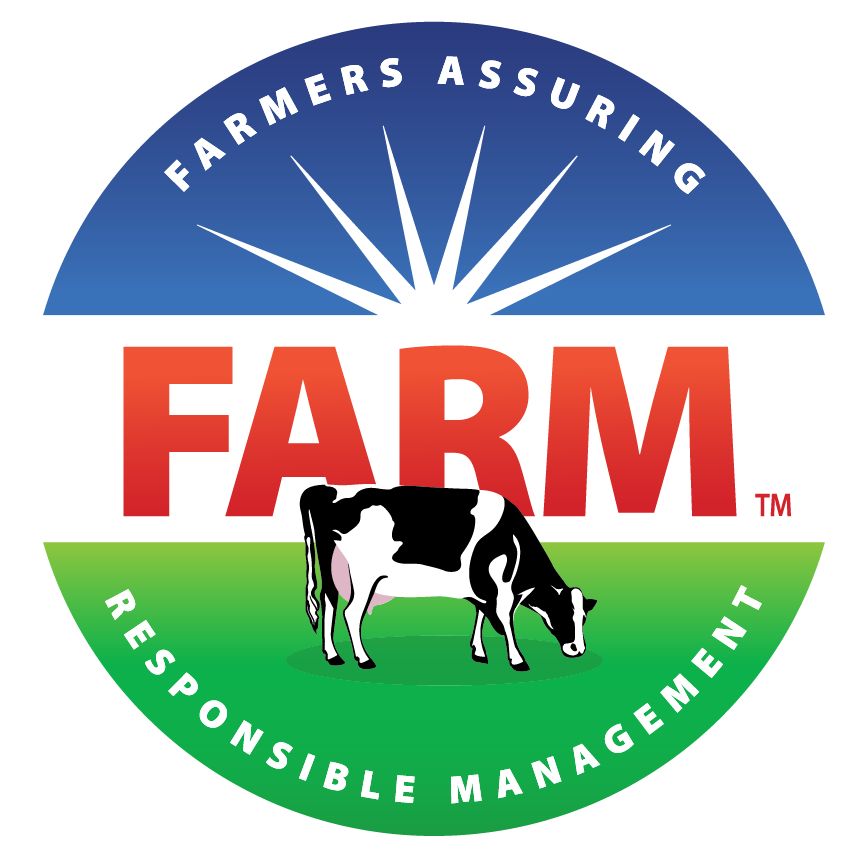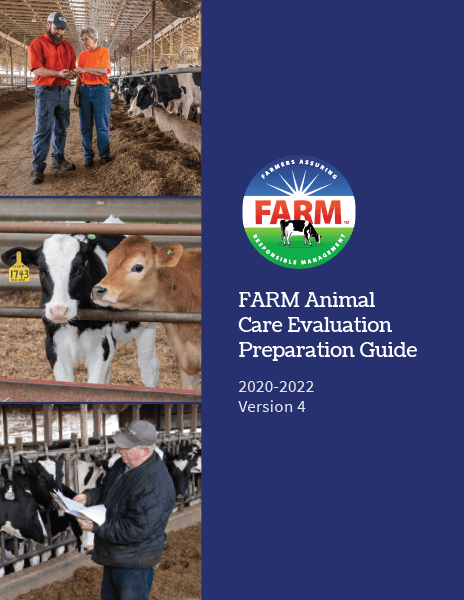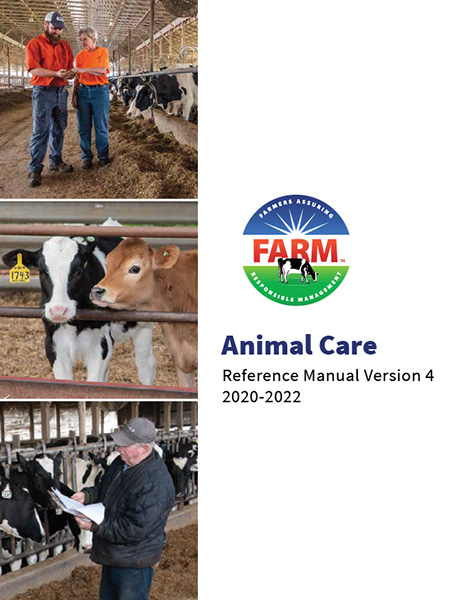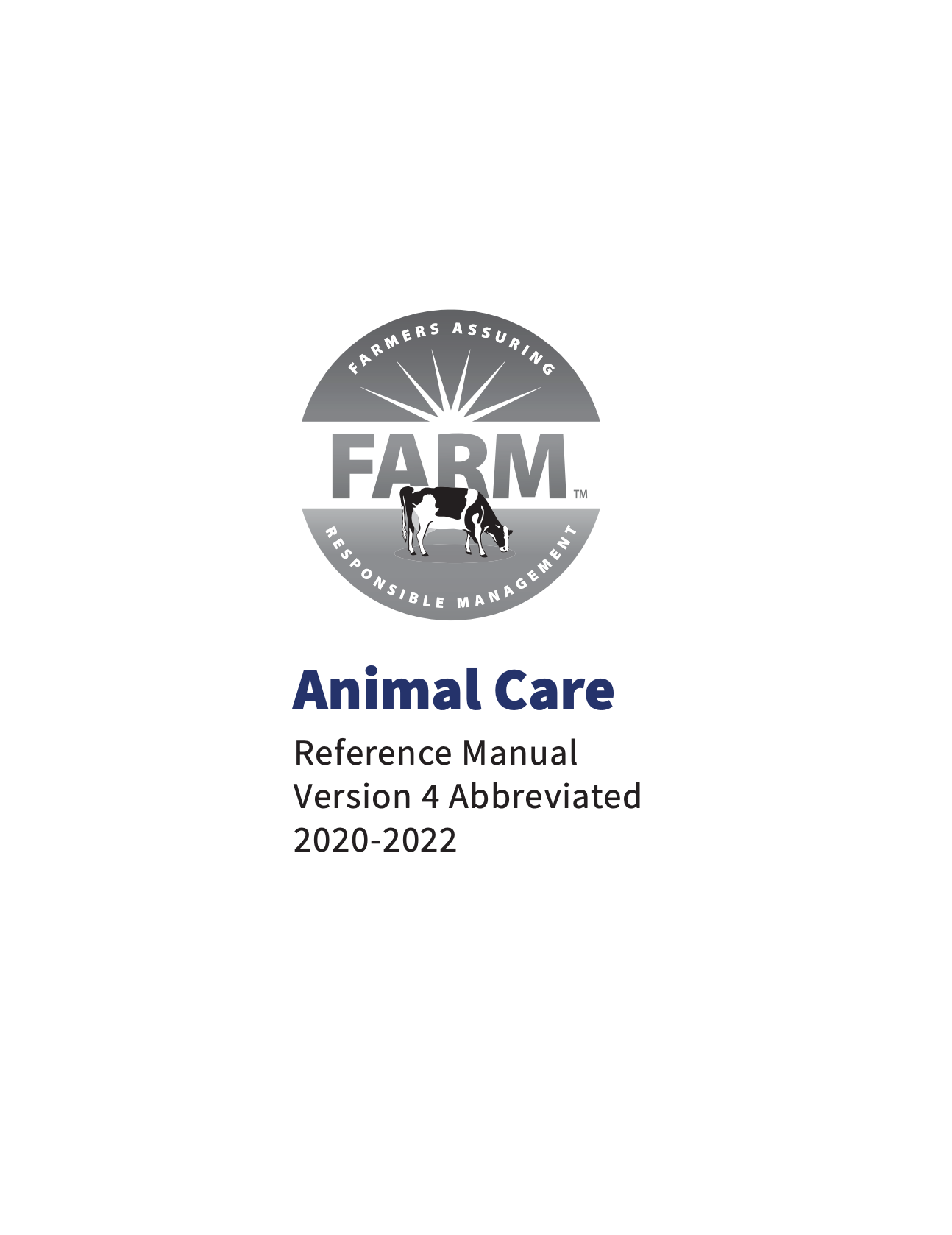FARM Animal Care Version 4
The FARM Animal Care Program standards are revised every three years to reflect the most current science and best management practices within the dairy industry. The current standards, rationale, and accountability measures have been reviewed and revised by the FARM Animal Care Taskforce and National Milk Producers Federation Animal Health and Well-Being Committee. They have proposed the following items for consideration with an open public comment period on the 4th version of FARM Animal Care. Below are the outlined National Dairy FARM Program Animal Care Version 4 corrective actions approved by the National Milk Producers Federation Board of Directors on June 5, 2019. These standards will be in place from January 1, 2020 to June 30, 2024.
Definitions
Conditional Certification: If a Mandatory Corrective Action Plan (MCAP) or Continuous Improvement Plan (CIP) are not satisfactorily resolved by date set by FARM or the FARM Animal Care Participant, the facility will have a Conditional Certification for up to 60 days; a FARM Animal Care Participant may continue to procure milk from a facility with a Conditional Certification and remain in good standing with FARM. Once the MCAP or CIP is resolved within the 60 day period, the facility will be returned to full Certification status.
Conditional Decertification: If a Mandatory Corrective Action Plan (MCAP) or Continuous Improvement Plan (CIP) are not satisfactorily resolved by date set by FARM or the FARM Animal Care Participant, and the facility has had Conditional Certification for 60 days without satisfactorily resolving the MCAP or CIP, the facility will be considered Conditionally Decertified. A FARM Animal Care Participant may not continue to procure milk from a facility with a Conditional Decertification and remain in good standing with FARM. Evidence of MCAP or CIP resolution must be provided to FARM in order for the facility to be returned to full Certification status.
Corrective Actions
Immediate Action
Requires that the standard is met immediately. Failure to meet this standard will result in the facility being placed on “Conditional Certification” for 48 hours or less once the standard is met. If after the 48 hour “Conditional Certification”, the facility continues to not meet the standard, the facility will be “Conditionally Decertified” until the standard is met. A program participant will be delisted from FARM if they continue to procure milk from a “Conditionally Decertified” facility. If the facility is placed on “Conditional Certification” for an Immediate Action standard, there is the expectation that the facility is followed up with at 1 week, 1 month and 3 months interval to ensure standard is met.
The facility complies with the ban on routine tail docking
Mandatory Corrective Action Plans | MCAP
Requires that the standard is met within nine (9) months or less as determined by the program participant. Failure to meet these standards within this allotted timeframe will result in the facility being placed on “Conditional Certification” leading to “Conditional Decertification” if standards are not met after the designated timeframe. A program participant will be delisted from FARM if the continue to procure milk from a “Conditionally Decertified” facility.
- Veterinarian Involvement:
- The facility has a written Veterinarian Client Patient Relationship (VCPR) that is signed by the farm owner and Veterinarian of Record annually.
- The written herd health plan is reviewed annually by the Veterinarian of Record.
- Pre-weaned Calf Practices including:
- How calves are moved
- Volume and quality of colostrum, milk/milk replacer
- Disbudding calves prior to eight (8) weeks of age
- Feed and Water Access by day three (3)
- Pre-weaned Calf Protocol including:
- How calves are moved
- How colostrum, milk/milk replacer, feed and water are provided
- Disbudding of calves prior to 8 weeks of age
- Feed and Water Access by day three (3)
- Acceptable Non-Ambulatory Animal Practices including:
- Moved using proper methods
- Providing prompt medical care
- Providing access to feed, water, protection from heat and cold for typical climatic conditions, isolation from other ambulatory animals and protection from predators
- Non-Ambulatory Animal Protocol including:
- How non-ambulatory animals are moved
- What prompt medical care is provided
- Outlines that non-ambulatory animals are provided with access to feed, water, protection from heat and cold for typical climatic conditions, isolation from other ambulatory animals and protection from predators
- Acceptable Euthanasia Practices including:
- Criteria for the identification of animals to be euthanized are established
- Euthanasia techniques follow the approved methods of AABP and/or AVMA
- Carcass disposal is conducted using the appropriate method
- Euthanasia Protocol including:
- Criteria for the identification of animals to be euthanized
- The euthanasia techniques that follows the approved methods of AABP and/or AVMA
- How carcass disposal is conducted using an appropriate method
- Acceptable Fitness of Transport protocol
- Feed access for all age classes
- Water access for all age classes
- Signed cow care agreement for any non-family employees with animal care responsibilities
- Continuing Education including:
- Continuing animal care and handling education for non-family employees with animal care responsibilities
- Job specific continuing education for non-family employees if they are responsible for:
- Pre-weaned calf care
- Non-ambulatory animals
- Euthanasia
- Determining animals are fit to transport
Continuous Improvement Plan | CIP
Requires that action has been taken to meet the standard within a minimum of three (3) years or less as determined by the program participant. Failure to meet this standard within this allotted time frame will result in the facility being placed on “Conditional Certification” leading to “Conditional Decertification” if standards are not met after the designated time frame. A program participant will be delisted from FARM if they continue to procure milk from a “Conditionally Decertified” facility.
- Animal observations benchmarks met for:
- Body condition score | 99% or more of all age classes of animals have a body condition score of 2 or greater on FARM Body Condition Scorecard
- Hock | 95% or more of lactating cows score 2 or less on the FARM Hock Scorecard
- Knee | 95% or more of lactating cows score 2 or less on the FARM Knee Scorecard
- Locomotion | 95% or more of lactating cows score 2 or less on the FARM Locomotion Scorecard
- Broken tails | 95% or more of all lactating cows do not have broken tails
- Pain Management Practice and Protocol for disbudding
- Pain mitigation is expected to be used when disbudding calves for any method. (cautery, paste, etc.)
- It is expected that the producer work with their veterinarian to determine the appropriate pain mitigation to use for disbudding
- Permanent written or electronic drug treatment records are maintained and available for review by veterinarian of record
- Signed cow care agreement for any family employees with animal care responsibilities
- Continuing Education including:
- Continuing animal care and handling education for family employees with animal care responsibilities
- Job specific continuing education for family employees if they are responsible for:
- Pre-weaned calf care
- Non-ambulatory animals
- Euthanasia
- Determining animals are fit to transport



